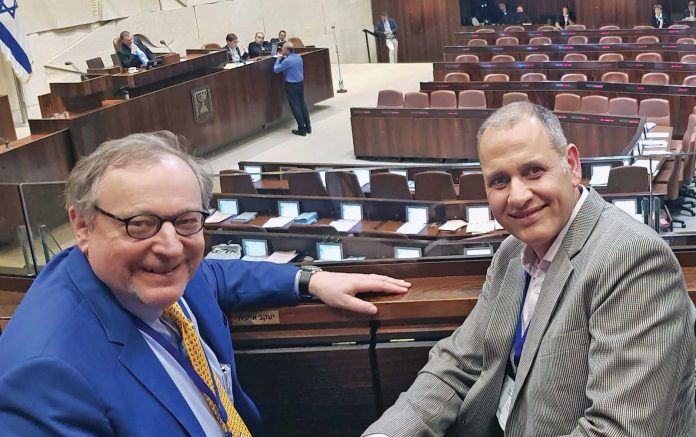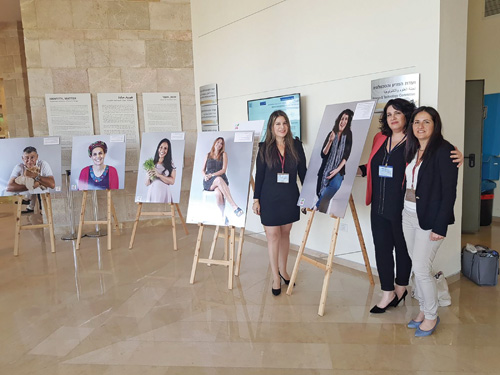
By Shani Shilo, DMD, PhD, and
Nir Peled, MD, PhD, FCCP
Posted: June 2018
On March 6, 2018, the Israeli parliament, the Knesset, held a Science and Technology Committee meeting devoted to lung cancer, new technologies, and their effects on the future of care. The meeting was an initiative of the Israel Lung Cancer Foundation and was led by the parliament member Uri Maklev and three additional members. The Israeli Lung Cancer Foundation initiated this meeting after the annual health basket committee rejected reimbursement for high-risk cohorts on the national screening protocol (annual low-dose CT scans) due to prioritization of issues regarding other health technologies. In addition, this was the first time there was a dedicated committee in the Israeli parliament to discuss lung cancer innovations.
Shani Shilo, DMD, PhD, founder and CEO of the Israeli Lung Cancer Foundation, opened the meeting, sharing her experience as a caregiver to her spouse. Dr. Shilo’s husband was misdiagnosed as having ALK-positive disease and was later diagnosed by hybrid next-generation sequencing (intron 19 deletion). His disease has completely responded to treatment for nearly 7 years. Through Dr. Shilo’s initiation of the Israel Lung Cancer Foundation, she has been able to affect reimbursement approvals during the past several years to establish a sharing community with thousands of caregivers and patients, who provide one another with support and information.

Nir Peled, MD, PhD, FCCP, the Foundation’s co-founder and president, elaborated on new technologies. Additional speakers included Dr. Abed Agbaria, from the management committee of the patient foundation, Yair Bar, MD, PhD, head of the Israeli Physician Lung Cancer Group, and Amir Onn, MD, head of the Head of the Institute of Pulmonology, Physiology, and Exercise at Sheba Medical Center.
IASLC CEO Fred R. Hirsch, MD, PhD, provided the international perspective. His talk emphasized the importance of communication and collaboration to improve lung cancer early diagnosis and treatment. He described the salutary eff ects of lung cancer screening on stage shift, reduced lung cancer mortality, and decreased expenses in comparison to the current expenses associated with treatment of patients with advanced disease. Further, he underscored the importance of early diagnosis and availability of study drugs.
“The meeting with the Knesset was a very important meeting for the Israeli lung cancer community. I fully support them in their efforts to implement the best preventive measures and highest-quality lung cancer care in Israel,” Dr. Hirsch said. “It was also an important meeting for the IASLC regarding interaction with politicians and participation in a government system. It is a part of the society’s new strategic plan to facilitate implementation of preventive measures and optimal treatment care in various countries via discourse at the government level.”
A member of the patient foundation, a caregiver for her mother with small cell lung cancer, discussed the difficulties of managing her loved one, the need for new treatments, and the high burden of care on patients’ families. Additionally, an exhibition entitled “Breath Friends” was displayed. This exhibition, which was photographed by Meir Rakocz, DMD, MHA, a patient himself, showed the faces of patients with lung cancer along with their caregivers and exhibited both the versatility of patients with lung cancer and the hope this new era of therapies has brought.
The Israeli healthcare services provides molecular profiling to all patients with NSCLC, per the IASLC guidelines; however, the Israeli Lung Cancer Foundation is now pushing for next-generation sequencing for all patients with advanced NSCLC. Fortunately, the availability of all drugs is generous in Israel and stands in parallel to the situation in the United States. Drug registration is very efficient and happens immediately after U.S. Food and Drug Administration approval. Reimbursement may even precede drug registration in unique circumstances.
Lung cancer screening, although a topic of importance, was not allowed to be mentioned, as the Foundation had appealed to the high court of justice to have it incorporated in the Israeli health system and received a notice from the law council of the Knesset to forego discussion of this topic during the meeting. Follow-up meetings are planned. ✦
About the Authors: Dr. Shilo is founder and CEO of the Israeli Lung Cancer Foundation. Dr. Peled is head of The Cancer Institute, Soroka Medical Center and Ben-Gurion University, Beer-Sheva, Israel; head of the Thoracic Oncology Assembly, European Respiratory Society; committee cochair, Prevention, Screening & Early Detection of Lung Cancer, IASLC and the co-founder and president of the Israeli Lung Cancer Foundation.










